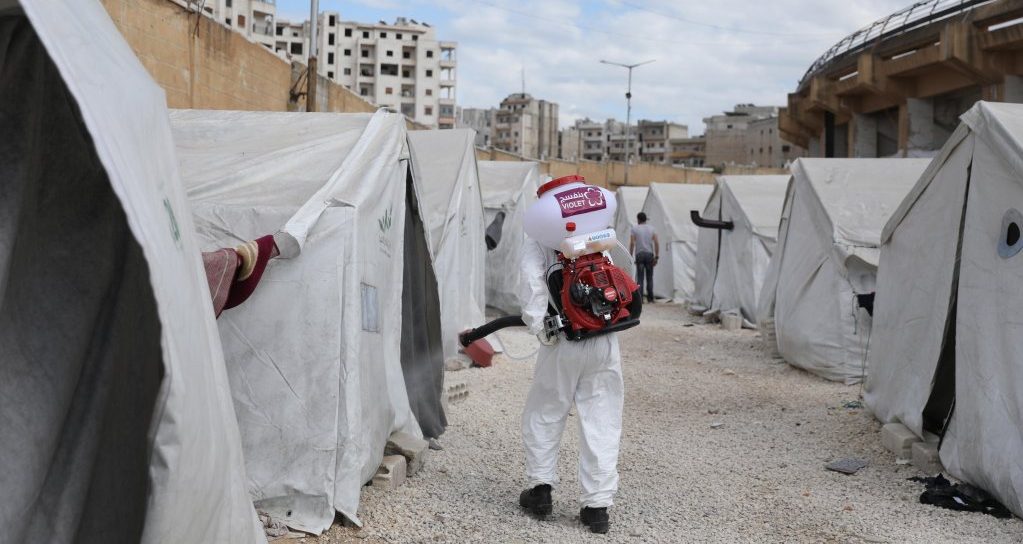Updates & Press
Featured | February 12, 2021
Weekly Humanitarian News Digest – February 1
Author | MedGlobalComms

Each week, we highlight the latest news related to the humanitarian and health crises in our countries of operation: Bangladesh/ Myanmar, Colombia/ Venezuela, Gaza/ Palestinan Territories, Greece, Lebanon, Pakistan, Sudan, Syria, and Yemen. For more frequent updates, make sure to follow us on Facebook, Instagram, and Twitter.
Cover Image: Info Migrants/EPA/Yahya Nemah
Latest News for February 5 – February 12, 2021
Bangladesh/ Myanmar
Despite the military coup in Myanmar, Bangladesh has expressed its desire to move forward with repatriating the nearly one million Rohingya refugees it hosts. In the days following the coup, the government of Bangladesh tightened border controls to prevent more Rohingya refugees from entering the country. While Bangladesh continues to negotiate the return of the Rohingya, the government is proceeding with its transfer of 100,000 refugees to Bhasan Char island amid allegations of coercion. (Nikkei Asia)
Colombia/ Venezuela
Colombia will grant temporary legal status to 1.7 million Venezuelan migrants. Migrants who entered the country before 2021 may register with authorities and legally stay in Colombia for 10 years. The majority of Venezueans in Colombia do not have legal status and face barriers to finding employment and accessing services. Colombian President Iván Duque is calling on the international community to help Colombia deal with the humanitarian crisis. (The New York Times)
Gaza/ Palestinian Territories
The West Bank has received 15,000 doses of COVID-19 vaccines in donations from Israel and Russia, some of which will be sent to Gaza. Gaza has yet to receive any vaccines for its population of two million people, the majority of whom are unemployed and living in poverty with limited ability to social distance. Israel’s health minister has claimed that Israel does not have an obligation to provide Palestinians with vaccines, despite its ongoing blockade of Gaza. (NBC News)
Greece
Doctors Without Borders (MSF) has warned of a mental health emergency in Greece’s migrant camps. Many migrant children that have witnessed violence, escaped devastating fires, and live in increasingly securitized camps are suffering severe depression. In 2020, MSF recorded 50 cases of children contemplating or attempting suicide. (Al Jazeera)
Lebanon
Lebanon’s health system is struggling to manage the COVID-19 pandemic as new cases surge and the positive test rate remains above 21%. Intensive care units in hospitals are nearly filled to capacity and many of Lebanon’s health workers have either left the country or contracted COVID-19. The financial crisis has caused extended delays in receiving medical supplies, including oxygen concentrators and ventilators, and pharmacies and hospitals face severe shortages of medications. (Los Angeles Times)
The United Nations estimates that 80% of the 1.5 million Syrian refugees in Lebanon live below the poverty line. Most refugees live in unofficial encampments and are forced to work in the informal sector. Lebanon’s financial crisis, the COVID-19 pandemic, and the Beirut port explosion have exacerbated the humanitarian crisis and disproportionately harmed Syrian refugees. (Newlines Magazine)
Pakistan
Pakistan has approved Russia’s Sputnik-V COVID-19 vaccine for emergency use. The government is currently conducting a vaccination campaign targeting frontline health workers. In addition to China’s donation of 500,000 doses of Sinopharm’s vaccine, Pakistan will receive 17 million doses of AstraZeneca’s vaccine through COVAX. (Reuters)
Sudan
Inter-communal violence in Sudan’s Darfur region has killed 470 people and displaced more than 120,000. Sudan’s transitional government has deployed troops to West Darfur and South Darfur to contain the violence, but civilians are afraid of government involvement due to past atrocities allegedly committed by militias backed by the Bashir government. (Associated Press)
Syria
Local authorities in northwest Syria have submitted a request to the COVAX program to receive COVID-19 vaccines independently of the Syrian government. Northwest Syria, which is controlled by de facto authorities, has recorded nearly 21,000 cases of COVID-19. Human Rights Watch has previously accused the Syrian government of withholding food and medical aid, including PPE, testing kits, and ventilators, to opposition areas and there are concerns that national vaccine campaigns may exclude the northwest. (Info Migrants)
Yemen
Yemen is expected to receive 2.3 million doses of AstraZeneca’s COVID-19 vaccine by March through COVAX. The COVAX program will ultimately provide 14 million doses, enough to vaccinate 23% of Yemen’s population. The purchase of additional vaccines to reach herd immunity may be financed by the Saudi government. (Middle East Monitor)


